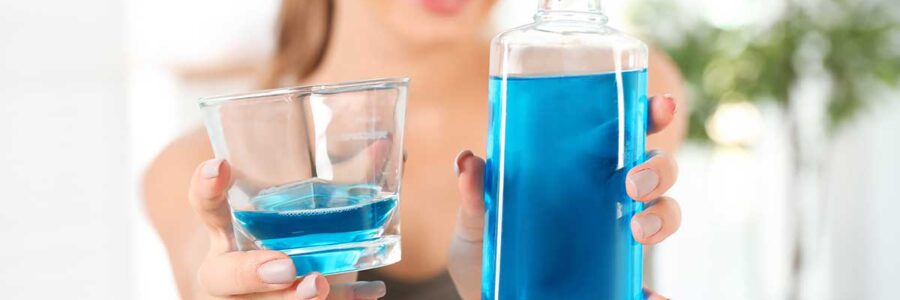In our pursuit of dental wellness, we typically adhere to a regimen of brushing, flossing, and using mouthwash. However, recent studies indicate that mouthwash might not be as beneficial as previously believed, particularly regarding its effects on the oral microbiome. This blog aims to shed light on the possible drawbacks of using mouthwash and to introduce natural methods for sustaining oral health while nurturing our oral ecosystem.
Understanding the Oral Microbiome
The oral microbiome is a complex ecosystem in our mouths, consisting of bacteria, viruses, fungi, and protozoa. This microbiome plays a pivotal role in our overall health, influencing oral health and our digestive and respiratory systems.[1,3] Maintaining a balanced oral microbiome prevents tooth decay, gum disease, and bad breath. However, this balance can be disrupted by diet, oral hygiene practices, and mouth care products like mouthwash.[2]
The Potential Dangers of Mouthwash
Many mouthwashes have broad-spectrum antibacterial properties, which can disrupt beneficial microbes in the mouth.[2] Ingredients like alcohol in many mouthwashes can cause dry mouth by reducing saliva production, which is vital for neutralizing acids and repairing tooth enamel.[4] Chlorhexidine, another common ingredient, though effective against plaque and gingivitis, can alter taste perception and stain teeth over time. Moreover, some studies link frequent mouthwash use with an increased risk of oral cancer.[5] Disrupting the oral microbiome can also have broader implications, such as an increased risk of hypertension.[6]
Healthy Alternatives to Mouthwash
To mitigate the risks associated with conventional mouthwash, consider these natural alternatives:
- Saltwater Rinse: A gentle way to cleanse the mouth, helping to neutralize pH and reduce bacteria.
- Oil Pulling: Swishing oil in the mouth, such as coconut or sesame oil, is believed to remove toxins, reduce plaque, and promote gum health.
- Herbal Mouth Rinses: Using natural ingredients like aloe vera, tea tree oil, or clove to create mouth rinses with antibacterial and soothing properties.[7]
- Probiotic Lozenges: Specific strains of probiotics can help rebalance the oral microbiome, especially beneficial after antibiotic use.[8]
- Green Tea Rinse: Offers anti-inflammatory and antibacterial benefits and is rich in antioxidants.
- Hydration and Diet: Good hydration and a balanced diet rich in fruits, vegetables, and fiber positively impact oral health.[9]
Incorporating these natural methods into your oral care routine can support your oral microbiome and enhance overall health.
Summary
Traditional mouthwash might have short-term benefits but poses risks to the oral microbiome and overall health in the long run. Alternatives like saltwater rinses, oil pulling, herbal rinses, probiotic lozenges, and green tea rinses offer a safer approach to oral hygiene. Coupled with a balanced diet and proper hydration, these methods promote better oral and general health. We encourage consulting with dental professionals to determine the best care approach for individual needs.
References:
- Deo, Priya Nimish, and Revati Deshmukh. “Oral microbiome: Unveiling the fundamentals.” Journal of Oral and maxillofacial pathology: JOMFP vol. 23,1 (2019): 122-128.
- Brookes, Zoë, et al. “Mouthwash Effects on the Oral Microbiome: Are They Good, Bad, or Balanced?” International Dental Journal, 2023.
- Pathak, Janak L., et al. “The Role of Oral Microbiome in Respiratory Health and Diseases.” Respiratory Medicine, vol. 185, 2021.
- Buzalaf, Marília Afonso Rabelo et al. “Saliva and dental erosion.” Journal of applied oral science: Revista FOB vol. 20,5 (2012): 493-502.
- Ustrell-Borràs, M et al. “Alcohol-based mouthwash as a risk factor of oral cancer: A systematic review.” Medicina oral, patologia oral y cirugia bucal vol. 25,1 e1-e12. 1 Jan. 2020.
- Joshipura, Kaumudi, et al. “Over-the-counter mouthwash use, nitric oxide, and hypertension risk.” Blood pressure vol. 29,2 (2020): 103-112.
- Kamath, N P et al. “The effect of aloe vera and tea tree oil mouthwashes on the oral health of school children.” European archives of paediatric dentistry: official journal of the European Academy of Paediatric Dentistry vol. 21,1 (2020): 61-66. doi:10.1007/s40368-019-00445-5
- Haukioja, Anna. “Probiotics and oral health.” European journal of dentistry vol. 4,3 (2010): 348-55.
- Scardina, G A, and P Messina. “Good oral health and diet.” Journal of biomedicine & biotechnology vol. 2012 (2012): 720692. doi:10.1155/2012/720692


